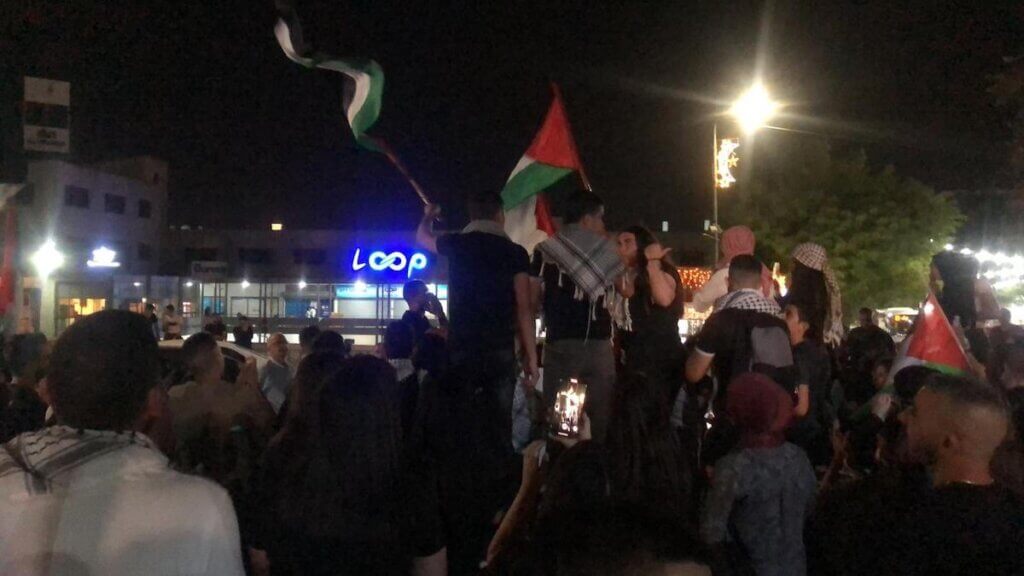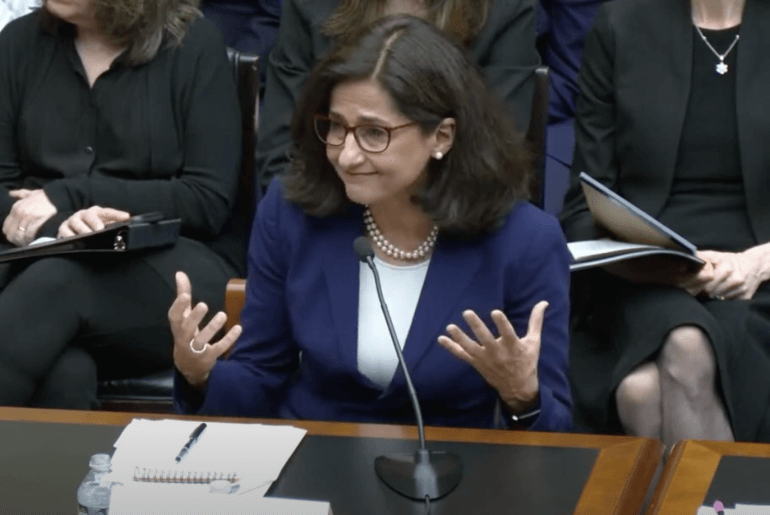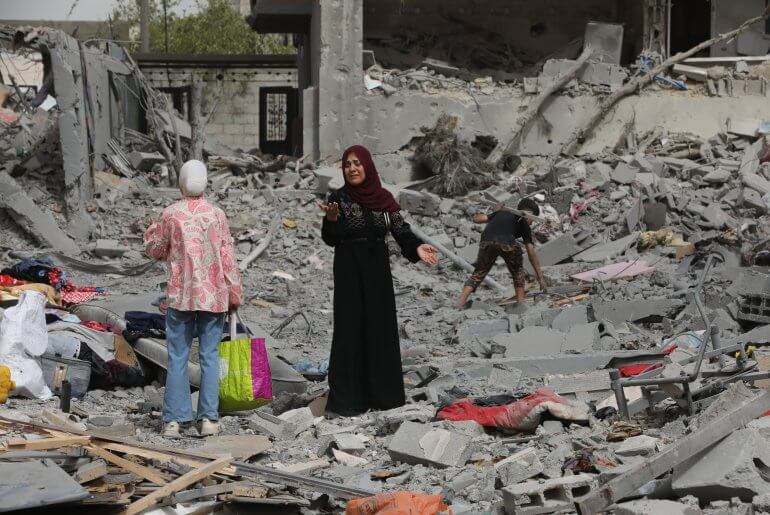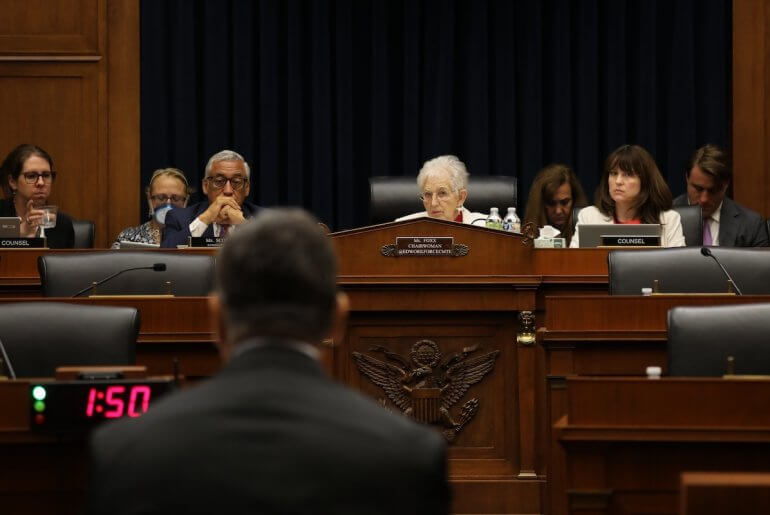While browsing the infamous Nazareth sweets shops, selecting the perfect mouth watering supply of kolaj and ma’moul in preparation for the celebratory end of Ramadan Eid al-Fitr, Palestinians were suddenly snatched from the streets in mass by plainclothes undercover Israeli officers.
The beatings began in the evening and lasted through the night. Detainees were made to remain kneeling, hunched forward, hands restrained, head down, even a deep breath or cough commanded a punch from an Israeli officer.
For over three hours Carlo Roushroush could do nothing but look on in shock at the sight of his fellow captives’ abuse.
“It was a madhouse, there is no other way to describe it,” Roushroush told Mondoweiss, the sound of laughter from an Israeli officer as he administered a round of swings with his baton, still hauntingly fresh in his memory.
Near daily demonstrations rocked the typically sleepy tourist town throughout the month of May as Palestinian residents across Israel and the occupied Palestinian territory remained unified in protest against settler expansion in East Jerusalem, violent incursions on Al-Aqsa mosque compound, and a war in Gaza.
At around 8:30 pm on May 12 as Roushroush, a lawyer from Nazareth, stood among other volunteers readily available to provide legal aid to those arrested during the demonstrations, little did he know that he himself would become one of the targets.
The 30-year-old was called by name when an undercover Israeli officer pointed at him, “it was like he knew who I was and was searching for me” Roushroush said.
Roushroush’s arrest came right after Israeli forces began to fire stun grenades on the crowd, a mere 30 seconds from when demonstrators were originally given five minutes to clear the area of Mary’s Well Square, located in the heart of the city.
“The whore house has ended and now we will show you what it really is”, the intelligence officer said in Hebrew to Roushroush as he was led in handcuffs to the Maskobiyeh police station.

‘There was blood everywhere’
Testimonies collected by Adalah – The Legal Center for Arab Minority Rights in Israel, from Palestinians detained at the Nazareth police station from May 9 to May 14, reveal graphic reports of extreme psychological and physical abuse at the hands of Israeli special forces.
Arrests were mainly carried out indiscriminately by Israeli border police and undercover Mista’arvim (a counter-terrorism unit of the Israeli Border Police and the Israeli Defense forces) officers posing as Palestinians.
Manhal Hayek, a 35-year-old activist from Nazareth, talked about what he witnessed at the protests, “They (Israeli forces) used rubber bullets and tear gas and were assaulting people in a savage way at random, even bystanders, it was barbaric,” Hayek told Mondoweiss.
Out of the over a hundred arrests made during this time period, Palestinians who were taken to the station in Nazareth recounted the inhumane treatment they endured in what they characterized as the “torture room.”
As Roushroush sat sequestered with 16 other men, none of which had been made aware of the reason for their detention, he witnessed Israeli special forces officers in a drugged like euphoric state:
“They would scream over and over for us to keep our heads down and not speak, and every time they said this they would hit them with their boots and hands, anything they had . . . they would slam a door just to surprise the detainees so people would look up to see what was happening and then they would hit them again” Roushroush said.
According to Roushroush, he was able to avoid most of the physical abuse due to his employment as a lawyer, however, he recalled a particularly disturbing instant he witnessed while in the room.
“One of the detainees put his head up so an officer hit him with the end of his firearm, blood starting rushing from his head, he was left like that as the officer used a water bottle to clean his boots off”.
The officer then began to scrub the floor, turning to beat another detainee with the stick of the mop, “Look at his hand, it turned purple!” Roushroush remembered one of the officers declaring proudly.
Victims’ testimonies also detail how officers would encourage one another to inflict more pain in their beatings and shout vulgarities about detainees’ female relatives and wives.
Ambulances were sent to the station almost every night to treat detainees. According to Wesam Sharaf, an attorney for Adalah, some medical aid was conditional upon the victims signing an agreement with police officers that they would complete a home arrest sentence.
“It was a choice of no choice, I would imagine any person in that situation would sign these papers just to save their lives,” Sharaf told Mondoweiss.
When volunteer lawyers were finally able to meet their clients after being blocked from entering the station for hours by police, they found them in a state of shock and distress. Witnesses in the courtroom confirmed that detainees bore signs of physical abuse.
“It was one of the hardest experiences for me in my career. It was a terrible feeling to know you were not able to stop the torture of these young people who were just exercising their right to use their voices and protest” Nareman Shehadeh-Zoabi, an attorney for Adalah, said.
Only five percent of those detained were indicted for their involvement in the protests, most were released the following day without any charges.
“I hope we can show the dogs outside what we are doing to these dogs to scare them,” Roushroush recalled one of the police officers saying.
Reports amounting to torture
In a formal legal complaint filed by Adalah on June 7 regarding the affidavits, attorneys Wesam Sharaf and Nareman Shehadeh-Zoabi said reports of police brutality amounted to torture and demanded a formal criminal investigation into the policemen involved.

According to Israeli law, authorities have 45 days to respond to the request.
“We haven’t received a reply from Mahash, the police investigation unit, to the main issue here — the torture and ill-treatment of the detainees,” Sharaf told Mondoweiss.
Under international law, as outlined in Article 5 of the Universal Declaration of Human rights, torture in addition to “all other forms of cruel, inhuman, degrading or humiliating treatment” are illegal.
Reports came as Israel launched “Operation Law and Order”, a mass arrest campaign in May, in which around 2,142 people were detained, 184 resulting in indictments.
As thousands of protestors stood in defiant objection to the forced expulsion of Palestinians from Sheikh Jarrah, attacks on the al-Aqsa mosque compound, and Israel’s siege on Gaza, the operation was widely seen as an attempt to squash Palestinian dissent.
Out of 150 people arrested in Nazareth in May, only about one in 10 resulted in indictments.
“We believe that this violence was just arbitrary abuse and harassment to suppress the protestors,” Shehadeh-Zoabi told Mondoweiss.
Roushroush is now working to represent victims of police brutality who were indicted on charges for their alleged involvement in the protests.
However, Roushroush expressed that the trauma doesn’t end in the courtroom:
“A lot of the detainees are seeking psychiatric care . . . one told me that three days after he was released from the station he still couldn’t eat or sleep. He was waking up in the middle of the night screaming,” Roushroush said.
Impunity for ISA officers
Torture has long been part of the Israeli Security Agency’s (ISA) interrogation tactical toolkit for controlling Palestinians in the occupied Palestinian territory.
Despite ratifying the International Convention Against Torture in 1991, Israel has yet to enact domestic legislation criminalizing torture. This has allowed security forces to avoid prosecution through a series of legal loopholes; classifying methods of severe violence as “necessity interrogations” in cases where victims were of an immediate security threat.
No officers have been prosecuted out of the 1,2000 complaints filed against ISA interrogators for allegations of torture since 2001.
Some of the techniques used on Palestinian political prisoners held in Israeli detention by ISA officers include; positional torture where detainees are made to sit in stress positions for long periods of time, solitary confinement, beatings, sleep deprivation, sexual torture, and verbal harassment have been reported by victims.
According to Tal Steiner, Executive Director at the Public Committee Against Torture in Israel, there has been a sharp increase in the past year of severe “necessity interrogations.”
“We at PCATI have seen some of ISA’s methods trickle from the West Bank into Israel. Generally, we have seen instances of extreme police brutality, primarily against minority groups within Israel proper, that can sometimes imitate the ones used in the West Bank by the security agencies there,” Steiner told Mondoweiss.
Out of the dozens of complaints PCATI receives every year, it is estimated by the organization that 5 to 10 percent of the cases amount to severe torture.
‘I thought I was going to die’
Nazareth local, Omaiyer Lawabne, was withdrawing cash from an ATM on the last night of Ramadan when Israeli soldiers fired stun grenades onto a nearby demonstration, sending the square into chaos.
Next thing he knew, Lawabne was being attacked by an Israeli border police officer.
“I covered my face while begging the cops who surrounded me to release me because I hadn’t done anything,” Lawabne recalled of his arrest.
Several more policemen then joined the officer in the assault, repeatedly kicking and punching Lawabne all over his body.
“At that moment, I thought I was going to die,” Lawabne said.
However the horror only got worse once Lawabne arrived at the station.
“There were a lot of detainees in the room, and I was shocked to see that they looked like prisoners of war: They were forced to sit on the floor, with their legs folded under their bodies and their heads held down. One masked officer was walking around the room with an object in his hand – I couldn’t tell if it was a club or something else – but everyone who raised his head was hit on the head with this object. They pushed me down into a corner and I lowered my head and curled up. Nevertheless, the same police officer hit me hard on the head with that object,” Lawabne said.
Despite his pleas, officers at first refused to provide Lawabne with medical attention.
“I felt a great pain in my head, I saw that there was a large amount of blood coming down from a head wound, and I felt very dizzy… When they saw this, the police dragged me out, and ordered me to put my head under a tap of water…..One of the cops told me to shut up and hit me on the stomach,” Lawabne recalled of his night at the police station.
PCATI’s Steiner believes that a continued rise in severe interrogations is in part a result of the endorsement given to the ISA by Israeli politicians.
In a statement issued by Benjamin Netanyahu in May when the former prime minister was considering plans to deploy military troops into Israeli cities to quell street violence he said: “We are hearing (police officers) whisper that they fear facing inquiry committees. We will give you all the tools, you have our support, don’t be afraid”
The former prime minister also encouraged officers to detain people under administrative detention, a form of imprisonment in which detainees can be held for indefinite periods of time without trial.
“The commanders in the field understand there is an implied impunity for their actions, and as long as there is no law condemning this kind of activity it will continue” Steiner told Mondoweiss.
Kelly Kunzl
Kelly Kunzl is an American freelance journalist, reporting on Palestine




1 of 2
Imagine Thousands of Bigots Marching through Jewish Neighborhood chanting “Death to Jews” with Police, Political Support; Now substitute “Palestinians” for Jews (juancole.com)
“Imagine Thousands of Bigots Marching through Jewish Neighborhood chanting ‘Death to Jews’ with Police, Political Support. Now substitute ‘Palestinians’ for Jews” by Asa Winstanley, Informed Comment, June 20/21″EXCERPT:
“Imagine that British police forces permitted a crowd of thousands to march through an area of London with a high Jewish population chanting ‘Death to the Jews’ and other similar violently bigoted obscenities.
“Imagine such a group of racists parading through areas such as Golders Green or Stamford Hill spewing ‘May your shtetl burn’ and threatening that a ‘second Holocaust’ would come soon.
“Then, imagine that the police, far from trying to stop such a poisonous event from taking place, actually took the side of the racists, protecting them as they went along. Imagine the police attacking not the racists, but instead a small group of anti-racist counter-protestors trying to voice objection to the anti-Jewish incitement taking place. Imagine the police assaulting the counter-protestors and snatching away their placards or flags.
“Then, imagine that senior British politicians praised the police for allowing the racist demonstration to take place, bizarrely insisting that the ‘Death to the Jews’ demonstration ‘had to be approved’ and applauding the ‘excellent’ management of the event.
“Imagine that a well-known elected politician from an opposition party even attended the ‘Death to the Jews’ demonstration himself. Imagine the same politician was recently exposed by the media as having praised 2018’s Pittsburgh synagogue shooting, in which 11 Jewish people were murdered in their place of worship.
“Imagine the politician suffered no negative consequences as a result of the exposure of his genocidal anti-Jewish racism. If anything, his hatred seemed to endear him even more to his voters. His party gained more seats in parliament and came close to entering a coalition government during the subsequent election. Imagine that all this took place not just once, but every year.
“The beatings began in the evening and lasted through the night. Detainees were made to remain kneeling, hunched forward, hands restrained, head down, even a deep breath or cough commanded a punch from an Israeli officer.”
For a historical perspective I recommend that people read “My War Diary – Lebanon June 5 – July 1 1982” by Dov Yermiya. The book is out of print but there are used copies floating around on Amazon and other places. This article describes behaviors of Israeli police and soldiers that go way, way back.
2 of 2
“All of this is surely an impossible scenario. Well, yes. Thankfully, it’s certainly impossible in London, Paris, Berlin or New York. But not in Israel.
“With a few adjustments, the same appalling scene just took place in Jerusalem, the city that Israel claims as its capital. With one key difference: the gang of racist thugs were calling for ‘Death to the Arabs’ not ‘Death to the Jews’, since they were themselves Jewish.
“All this took place because Israel is an irredeemably racist state. A settler-colonial entity whose existence is premised on the violent expulsion and racist dispossession of the indigenous population of the land of Palestine.
“One of the underreported aspects of the appalling festival of anti-Palestinian racism that we saw the Israeli government and police encourage in Jerusalem this week was the sheer age of the demonstrators chanting these filthy slogans.
“The videos show young teens, and even children, chanting ‘Death to the Arabs’ in Hebrew as they raged through eastern Jerusalem – the area of the city where the most Palestinians live.
“The politician who joined them was Itamar Ben-Gvir, the leader of the Religious Zionism extremist party. Footage uncovered by Israeli television earlier this year showed Ben-Gvir dressing up as Baruch Goldstein.
“Goldstein was a fanatical settler who came from Brooklyn, New York and massacred 29 Palestinians while they prayed in Hebron’s Ibrahimi Mosque in 1994.
“This bloody terrorist act was actually rewarded by the Israeli Labor government of the day, as they imposed curfews on the city – not of the extremist Jewish settlers who plague that city, but of the native Palestinians who are the majority.
“Yet – as I alluded to in my scenario above – Ben-Gvir suffered no damage to his political career, and came very close to entering a coalition government with the last Israeli prime minister, Benjamin Netanyahu.”